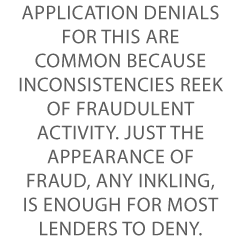Need a business loan in a recession? Beyond the SBA’s PPP program, you should also be looking at lenders outside the SBA’s purview. And you need to make it easier for them to approve your application.
We Smuggled out these Secrets: The 5 Ways You Can Get Denied for a Business Loan in a Recession – Your Banker Will Never Tell You About These
Did you know there are 5 ways you can get denied for a business loan in a recession? And let’s face it, your banker won’t tell you about ANY of them. It is, unfortunately, pretty easy to get a bank loan denial. This is particularly true in recessions. Bank loan money is always tighter.
And not everyone knows how it happens. So read on, and learn the secrets!
A Look at Bank Credit vs. Business Credit
Before going any further, do you know the difference between bank credit and business credit? Business credit is the full and complete amount of money that your small business can get from creditors. This includes leasing companies. It is also suppliers, under what’s called vendor credit.
Bank credit is the full amount of borrowing capacity which a small business can get from the banking system only.
What are Bank Credit Scores?
Even during a recession, a small business can get more business credit quickly, so long as it has two things.
One, it must have at least one bank reference. And two, it has to have an average daily account balance of at least $10,000. And that has to be for the most recent three month time period.
This set up will yield a bank rating of a Low-5. And that means it is an Adjusted Debt Balance of from $5,000 to $30,000.
Lower Ratings
A lower rating, like a High-4, or balance of $7,000 to $9,999 will not necessarily reject the small business’s loan application. However, it will slow down the approval process (in a recession, it could grind to a screeching halt). And a Low-5, we know, is far more likely to be necessary for an approval.
A bank credit rating is the average minimum balance a company maintains in a business bank account over a three month long period.
Hence a $10,000 balance will rate as a Low-5. And a $5,000 balance will rate as a Mid-4. By the same token, a $999 balance will rate as a High-3, etc.
A small business’s chief goal should always be to maintain a minimum Low-5 bank rating. So that means an average $10,000 balance. And they will need to do so for at least three months.
This is because, without at least a Low-5 rating, the majority of banks will operate under the assumption that the business has little to no ability to repay a loan or a business line of credit.
But here is one thing to keep in mind. You will never actually see this number. The bank will just keep this number in its back pocket.
Check out our professional research on bank ratings, the little-known reason why you will – or won’t – get a bank loan for your business during a recession.
The Rating Ranges
The numbers work out to the following ranges:
- High-5 – account balance of $70,000 to $99,999
- Mid-5 –$40,000 to $69,999
- Low-5 –$10,000 to $39,000 (your small business needs this level bank score or better to get loans)
- High-4 – $7,000 to 9,999
- Mid-4 – $4,000 to $6,999
- Low-4 – $1,000 to $-3,999
Bank Credit Problems that can Get Your Business a Denial
There are several ways to get a denial when you want a business loan. Here are the top five.
#1 Way You Can Get Denied for a Business Loan in a Recession
You’ll get a denial if you don’t maintain a minimum balance for at least three months. Since every bank credit cycle is based on the previous three months, a continually seesawing balance should damage your bank credit.
How You Can Fix It
So, what is the remedy? Keep cash in your account, by any means you can. This can be tough in a recession, but it is not impossible.
#2 Way You Can Get Denied for a Business Loan in a Recession
Looking to get a denial? Then don’t bother to assure that your business bank accounts are reported exactly the same way all of your business records are. And they would also have to be with the exact same physical address and phone number.
Sow confusion in this area by changing one and not another, or not correcting an error if there is one. And use a post office box!
Wrong.
How You Can Fix It
So, what is the remedy? Keep your records consistent. Copy and paste whatever you can. Do not chance it by retyping. And as for your location, if you do not want or need a physical office, go with a virtual one. We particularly like Regus and Alliance.
Can’t find any virtual office space nearby or within your budget? Then talk to other area business owners. And find out who they work with.
Check out our professional research on bank ratings, the little-known reason why you will – or won’t – get a bank loan for your business during a recession.
#3 Way You Can Get Denied for a Business Loan in a Recession
To go along with #2, you’ll get a denial if you don’t keep consistent, congruent records. That is, to make sure that every credit agency and trade credit vendor, every record keeper, lists the business name and address the exact same way.
These include record keepers for financial records, income tax, web addresses and e-mail addresses, directory assistance, etc.
No lender is going to stop to consider all of the ways that a business might be listed. That will not happen when they look into the business’ creditworthiness.
Therefore, if they are unable to find what they need easily, they will just deny the application. Or your carefully cultivated credit won’t report to the business credit reporting agencies. So if you want a denial, make sure your records are a mess!
No. Don’t do this.
How You Can Fix It
So, what is the remedy? Again, keep your records as consistent as possible. And if you need to hire someone to help you with this, then be sure to do so. It will be well worth it to get some peace of mind this area.
#4 Way You Can Get Denied for a Business Loan in a Recession
This one happens if you never manage your bank account responsibly. It means that your small business should not avoid writing non-sufficient funds (NSF) checks at all costs.
NSFs will decimate bank ratings.
Non-sufficient-funds checks are something which no business can afford to let happen.
But balancing checkbooks and accounts is so dull anyway. And you’ve got enough money without even making sure, right?
Wrong!
How You Can Fix It
So, what is the remedy? Carefully balance your books and make sure you have enough funds for your transactions.
So this might mean you hire someone with a bookkeeping or accounting background to help you. And that’s a great idea!
Beyond taking care of your business bank accounts, such an employee should be able to help you with the tax implications of pretty much everything that you do. All businesses will have to pay taxes. There are no exceptions to this rule! So why not legally and ethically pay less?
Check out our professional research on bank ratings, the little-known reason why you will – or won’t – get a bank loan for your business during a recession.
#5 Way You Can Get Denied for a Business Loan in a Recession
To add to #4, you’ll get a denial if you don’t add overdraft protection to your bank account as soon as possible, in order to avoid NSFs. But why bother thinking ahead or planning for the future? Everything is going to be great forever, right?
Wrong.
How You Can Fix It
So, what is the remedy? Overdraft protection is a valuable feature. So make sure you can get it. That might mean going to a bank that isn’t right around the corner from you. Or it might mean maintaining a specific minimum balance.
And if it does, then that’s even better. You’ll kill two birds with one stone and also address #1, above.
Bonus: #6 Way You Can Get Denied for a Business Loan in a Recession
Want to get a denial? Then don’t let your business show a positive cash flow. A positive free cash flow is the amount of revenue left over after your company has paid all of its expenses.
So if you really want to get a loan denial from your bank credit, go ahead and treat yourself. And buy whatever’s expensive for your business. And make sure your expenses outstrip your profits.
Because doesn’t every factory deserve plush carpeting in the loading dock?
Wrong.
How You Can Fix It
So, what is the remedy? The cash coming in and leaving your company’s bank account should reflect a positive free cash flow.
When an account shows a positive cash flow it indicates your business is generating more revenue than is used to run the company. That means the bank will feel your business can pay its bills.
Can’t afford to add a lot at a time? That’s okay – long as you are adding something.
In a recession, it’s obviously harder to keep adding to a business bank account. Just … try.
Bonus: #7 Way You Can Get Denied for a Business Loan in a Recession
Banks are highly motivated to lend to a business with consistent deposits. And a business owner must also make regular deposits. So this is in order to maintain a positive bank rating.
The business owner must make a lot of consistent deposits, more than the withdrawals they are making. This is the best way to have and maintain a good bank rating.
If they can do that, then they will have a good bank credit score.
But consistency is the hobgoblin of little minds, right?
Hence depositing whatever, whenever has got to be the best way to handle your company’s bank deposits, right?
Wrong.
How You Can Fix It
So, what is the remedy? Consistency! Showing your bank is dependably and regularly adding funds will go a long way to assuring your bank that your business is credible.
And it’ll assure them that if they loan you money, that you’ll be able to pay them back.
And you’ll maintain your ethics and do so.
There are Many Ways You Can Get Denied for a Business Loan in a Recession
Yes, you can wreck your bank credit these five seven ways. So don’t! If you wreck your bank credit, then you may as well throw in the towel. And in a recession, you just plain can’t afford that.
This is because you’ll also tank your business. And no one wants to see that happen.
Particularly now, in the age of COVID-19, you need to help your business in any way you can.
The post Brutal! 5 Ways You Can Get Denied for a Business Loan in a Recession –Your Banker Won’t Tell You About These! appeared first on Credit Suite.






